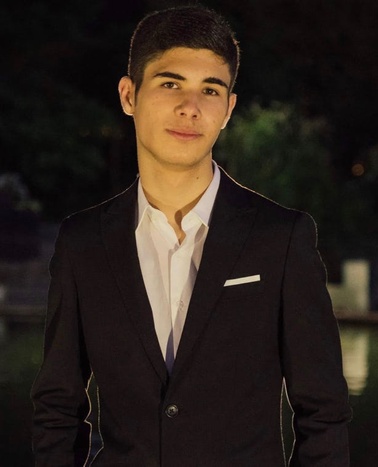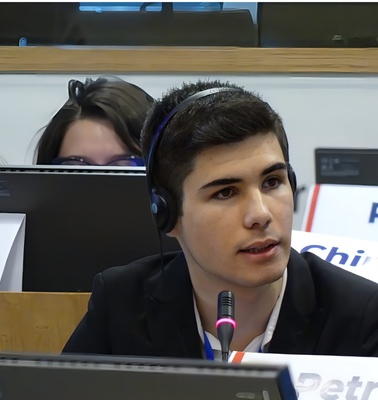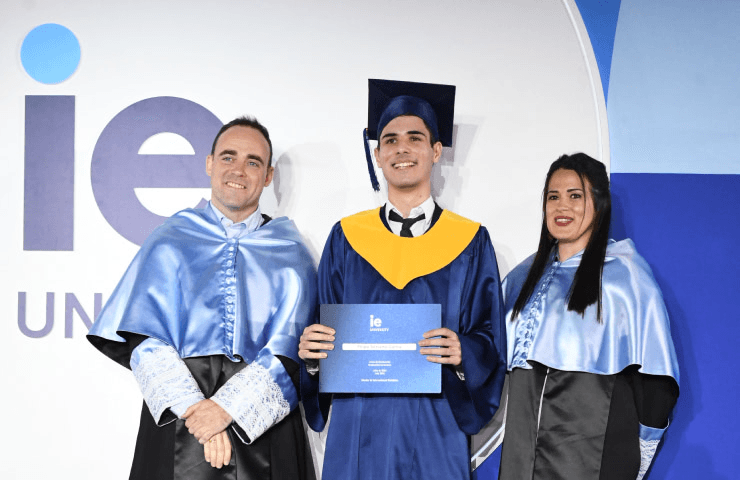
Filipe Serrano Gama
I’m Filipe and I come from Portugal. My career focus lies in international dispute resolution, particularly in arbitration, mediation and negotiation practices. My drive to work on a global scale stems from a desire to tackle complex, high-stakes disputes, where both legal precision and cultural fluency are essential. Ultimately, I aim to contribute to the achievement of fair, sound and sustainable outcomes that can positively impact multinational corporations, governments and global industries alike.

"Ultimately, I aim to contribute to the achievement of fair, sound and sustainable outcomes that can positively impact multinational corporations, governments and global industries alike."
Understanding the broader implications of legal decisions with a Dual Degree Master in International Relations & Master of Laws (LL.M.)
After completing an undergraduate law degree, Filipe Serrano Gama was looking for a master’s program that would deepen his legal knowledge and broaden his understanding of the global landscape of international disputes. The Dual Degree Master in International Relations & Master of Laws (LL.M.) at IE University enabled him to do just that. Filipe explains that the program “stood out for its diverse and highly interdisciplinary curriculum,” which allowed him to hone his expertise in international dispute resolution while delving into areas such as advanced ethical discourse, public policy and environmental governance. He considers all of these as essential for awareness of the broader implications of legal decisions.
Filipe explains that the knowledge he’s acquired in the Master in International Relations has enhanced his understanding of international legal practice. For example, studying ethical frameworks has given him the tools to assess the moral dimensions of dispute resolution. Learning how technology influences international affairs, meanwhile, has prepared him to tackle the challenges presented by technology and its potential impact on access to justice.
Since beginning his studies at IE University, Filipe has gained valuable knowledge for both his professional career and personal development. While he remains committed to pursuing a career in dispute settlement, his studies have expanded his horizons to a variety of fields that intersect with the law. For example, he has a growing interest in the influence of ethics on decision-making and how state power dynamics can shift the global balance of power.
Another attractive aspect of studying at IE University was, Filipe says, being part of an institution with future-forward research labs, such as Lawtomation, IE Center for European Studies and the LawAhead Center on the Legal Profession. He notes that they operate as “vibrant hubs for academic research and knowledge exchange,” enabling students to remain connected to real-life issues. In addition, he values the opportunity to learn directly from experienced legal professionals through a case-based approach where “the classroom mirrors the courtroom.”
Filipe emphasizes several aspects of the dual degree program that he’s found particularly rewarding. He’s impressed that the study plan is continuously updated to meet the growing need for skilled professionals in areas like data protection and privacy. This ensures that students remain closely aligned with the current needs of the profession.
Another highlight for Filipe was the inclusion of practice-oriented experiences such as the legal clinic. There, students have the chance to provide legal services to real NGOs and startups, along with opportunities to join international competitions that build skills in legal analysis, public speaking and courtroom procedures. Finally, the most impactful project of the program was, he says, the opportunity to collaborate on a Capstone Project with the United Nations Economic and Social Commission for Western Asia, as this allowed him to “tackle a tangible, real-world issue head-on.”
Filipe also names the wealth of workshops and sessions provided by IE University as a standout feature. He was impressed by his experience of the AI and the Law Initiative, where students learned from academics and top practitioners how artificial intelligence is reshaping the current legal landscape.
Filipe describes corporate law as “one of the most fascinating” areas he’s explored, with a strong interest in the structures and ownership of business corporations. International environmental law has also captured his interest, in particular the roles of both state and non-state actors in regulatory compliance, the challenge of balancing economic development with natural resource protection, and pathways towards a more sustainable future.
Looking to the future, Filipe aims to build his career in an impact-oriented setting where he can apply the knowledge acquired during the program. “I envision myself in a multicultural, multiperspective professional environment where I can proactively apply my expertise in law,” he says. Whether he eventually works for an international body, a leading law firm or an arbitration boutique, he hopes to deliver solutions that are not only effective for the parties involved but also sustainable and impactful in the long term.
Filipe’s advice to prospective students interested in the Dual Degree Master in International Relations & Master of Laws (LL.M.)? “I would say that if you are passionate about law and international relations, thrive in immersive and hands-on learning environments, and seek an interactive, student-centered educational approach, this is the place to be.”
